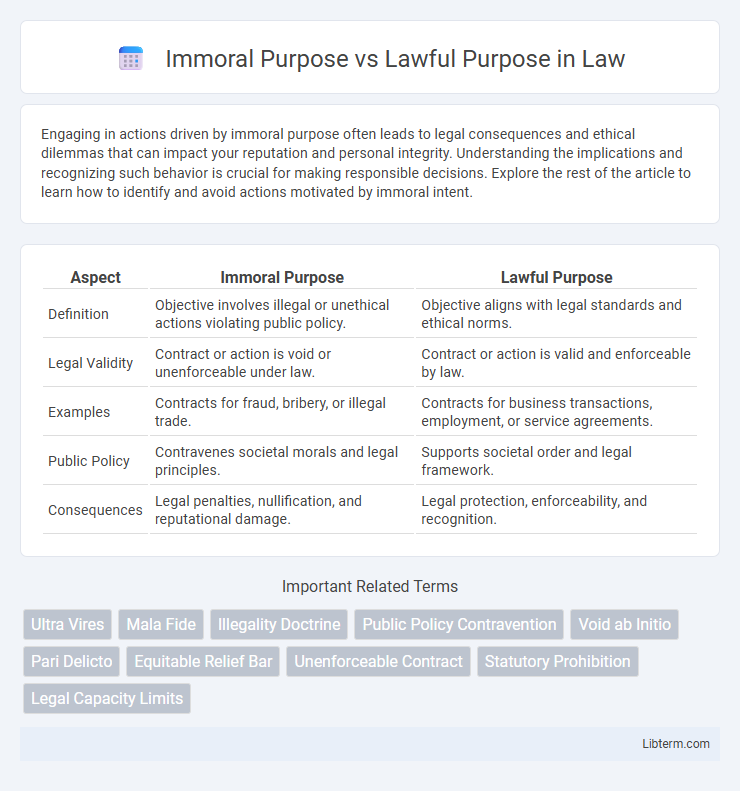Engaging in actions driven by immoral purpose often leads to legal consequences and ethical dilemmas that can impact your reputation and personal integrity. Understanding the implications and recognizing such behavior is crucial for making responsible decisions. Explore the rest of the article to learn how to identify and avoid actions motivated by immoral intent.
Table of Comparison
| Aspect | Immoral Purpose | Lawful Purpose |
|---|---|---|
| Definition | Objective involves illegal or unethical actions violating public policy. | Objective aligns with legal standards and ethical norms. |
| Legal Validity | Contract or action is void or unenforceable under law. | Contract or action is valid and enforceable by law. |
| Examples | Contracts for fraud, bribery, or illegal trade. | Contracts for business transactions, employment, or service agreements. |
| Public Policy | Contravenes societal morals and legal principles. | Supports societal order and legal framework. |
| Consequences | Legal penalties, nullification, and reputational damage. | Legal protection, enforceability, and recognition. |
Understanding Immoral and Lawful Purposes
Immoral purpose refers to actions or objectives that violate ethical standards or societal norms, even if not explicitly illegal, whereas lawful purpose aligns with activities permitted and regulated by law. Understanding immoral purposes involves recognizing conduct that undermines public morality, such as fraud or exploitation, while lawful purposes comply with legal frameworks promoting social order and justice. Differentiating these concepts is crucial for interpreting contracts, criminal liability, and legal enforceability in various jurisdictions.
Historical Perspectives on Morality and Law
Historical perspectives on morality and law reveal a complex interplay where the distinction between immoral and lawful purposes often reflects evolving societal values and legal frameworks. Ancient legal codes, such as Hammurabi's Code, merged moral imperatives with enforceable laws, illustrating early efforts to codify societal norms while addressing immoral conduct. Over centuries, shifts in religious, cultural, and philosophical thought have continually redefined the boundaries between what constitutes lawful actions and immoral intentions, shaping modern jurisprudence on the subject.
Legal Definitions of Lawful Purpose
Legal definitions of lawful purpose center on activities that comply with statutes, regulations, and public policies, distinguishing them from actions intended for immoral or illegal objectives. Lawful purpose involves conduct that aligns with the legal framework, ensuring contracts, agreements, or transactions are enforceable and valid under the law. Courts often assess lawful purpose by examining whether an agreement's intent conflicts with legal norms or ethical standards, invalidating those formed for immoral purposes such as fraud or criminal acts.
What Constitutes an Immoral Purpose?
An immoral purpose involves actions or intentions that violate ethical standards, societal norms, or fundamental moral principles, such as fraud, deceit, or harm to others. It often includes activities that are legally questionable but not explicitly illegal, emphasizing the breach of accepted codes of conduct and integrity. Courts typically assess whether the purpose contradicts public policy or undermines justice, distinguishing it from lawful purposes grounded in legality and ethical legitimacy.
Overlap and Divergence: Morality Versus Legality
Immoral purpose and lawful purpose often overlap when actions legally permitted still violate ethical standards, highlighting the divergence between societal morality and statutory law. Lawful purpose strictly adheres to legal frameworks while immoral purpose challenges these frameworks by prioritizing personal or cultural ethics over legal compliance. Understanding the distinction clarifies that legality does not inherently imply morality, and ethical conduct can exist outside legal boundaries.
Real-World Cases: Immoral Purpose in Legal Judgments
Courts frequently distinguish between immoral purpose and lawful purpose by analyzing the intent behind contractual agreements and actions in real-world cases; for instance, contracts made with the intent to defraud or commit a crime are declared void due to immoral purpose. In landmark legal judgments such as Carlill v Carbolic Smoke Ball Co., the court emphasized lawful purpose by upholding contracts promoting public safety, contrasting with cases like Everet v Williams where illegal schemes led to dismissal. Judicial scrutiny of purpose ensures that agreements serving societal interests are enforced, while those rooted in immorality or illegality face nullification to uphold legal integrity.
Societal Impact of Immoral vs Lawful Actions
Immoral actions often erode social trust and undermine legal frameworks, leading to increased crime rates and societal instability. Lawful actions promote order, protect individual rights, and foster community well-being by upholding justice and ethical standards. The contrast between immoral and lawful purposes significantly impacts public safety, economic development, and overall social cohesion.
Legislative Approaches to Immoral Purposes
Legislative approaches to immoral purposes often involve statutes that explicitly prohibit contracts or actions made with an intent that violates public policy or ethical standards. Laws typically distinguish immoral purposes from lawful ones by evaluating the underlying intent and societal impact, invalidating agreements aimed at fraud, corruption, or other illegal activities. Courts rely on these legislations to enforce the principle that contracts made for immoral purposes are void and unenforceable.
Ethical Dilemmas in Legal Interpretations
Legal interpretations often grapple with ethical dilemmas when distinguishing between immoral purpose and lawful purpose, as courts must assess intent beyond mere legality. Actions pursued with an immoral purpose may comply with statutory requirements yet violate underlying ethical principles, challenging the balance between law and morality. This tension highlights the importance of contextual analysis in judicial decisions to prevent exploitation of legal loopholes for unethical outcomes.
The Future of Law and Morality in Society
The future of law and morality in society will increasingly hinge on distinguishing immoral purpose from lawful purpose as legal systems evolve to address complex ethical dilemmas in technology, privacy, and human rights. Courts must balance societal norms and legal standards by interpreting statutes and precedents that reflect contemporary moral values without compromising justice or individual freedoms. Advances in AI, biotechnology, and global communication intensify the challenge of aligning legal frameworks with evolving moral principles while ensuring lawful purposes guide regulation and enforcement.
Immoral Purpose Infographic

 libterm.com
libterm.com